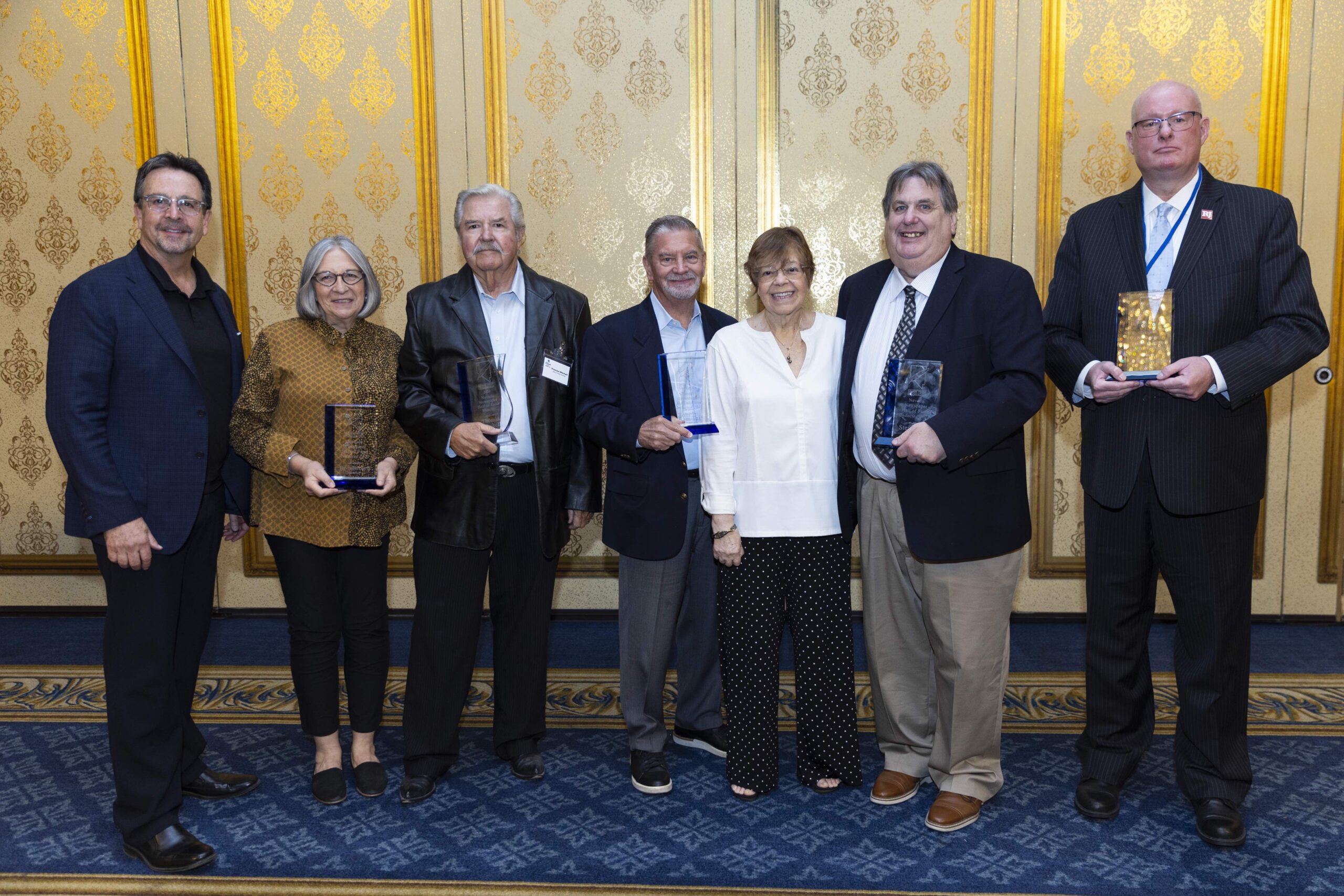Last weekend in Las Vegas, five new members and one existing member of the Nevada Newspaper Hall of Fame were officially inducted into the group, which already includes two former Nevada governors, the first woman to report on the Nevada Legislature, Hank Greenspun and Mark Twain.
The proceedings were emceed by Las Vegas Sun managing editor Ray Brewer.
Former Las Vegas Review-Journal editor Thomas Mitchell, who has originally inducted in 2020, finally had an opportunity to accept the honor in person. The 2020 Nevada Press Association convention was canceled due to COVID.
Mitchell’s brief acceptance speech was followed by addresses from three Las Vegas-area journalists — sports reporter Steve Carp, retired Review-Journal reporter and columnist Jane Ann Morrison and the recently retired Associated Press editor Tom Tait.
Mark Brown and Stephanie Brown accepted the honor on behalf of their father Bob Brown, the late founder and publisher of the Las Vegas Valley Times. And the event concluded with Review-Journal editor columnist Steve Sebelius’ moving acceptance on behalf of his recently slain colleague Jeff German.
The prepared remarks from each speaker are included below.
I have about two dozen plaques on the wall of my home office, dating back to 1975, but this is, by far, the most humbling recognition.
Who wouldn’t want to be in the same club with Mark Twain?
It was Twain who once wrote: “On the whole, it is better to deserve honors and not have them, than to have them and not deserve them.”
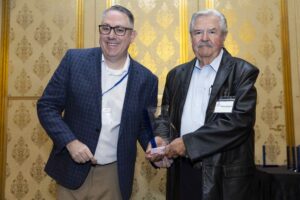
Well, over the years in Nevada journalism I had literally hundreds of reporters, editors, photographers, artists, secretaries and even a couple of publishers with whom I worked. They sure earned this by practicing professional and aggressive journalism, informing our community, our state and our nation I was just the guy in the front office. I accept this on their behalf.
Several of those co-workers have already been entered into the Hall of Fame and a couple more are about to be, all deservedly so, Mr. Twain.
Finally, he was a worthy competitor for two decades and too briefly a valued colleague. Rest in peace, Jeff German.
Thank you all for coming and congratulations to the other inductees. It’s an honor to share the podium with you today, particularly my friend and neighbor Jane Ann Morrison, whose induction was long overdue, as well as Tom Mitchell, Tom Tait and Bob Brown. And it is truly an honor to have the late Jeff German in our Hall of Fame induction class.
Jeff and I worked together, first at the Las Vegas Sun, then later at the Review-Journal and we got to collaborate on a couple of stories while at the Sun and we had been friends for years. I remain shocked and saddened by his death and I hope in the months ahead he and his family will receive justice for the heinous act perpetrated upon him. My deepest condolences to his family, his colleagues and his friends.
As for me and why I’m here today, I’d like to share a quick story with you.
A couple of months ago, I got a call from someone who I had been friends with growing up together in Brooklyn. We had lost track of each other after high school and I hadn’t heard from him for 48 years. So we talked and caught up with each other, trying to make up for lost time.
And as we were wrapping up our conversation, he said to me, “Of all the people who were in our class, you were the only one who knew what he wanted to do with his life and actually got to do it.”
I paused for a moment, thanked him for his kind words, told him I’d promise to stay in touch and after we hung up, I got to thinking. How lucky was I to pursue the career I envisioned for myself and actually got to do it? I always loved a good story and while I considered myself a good reporter and versatile writer, I always thought of myself as a storyteller first.
I am the first journalist in my family and I guess it stems from reading the newspaper, sometimes two or three each day. I remember as a kid New York had 11 daily newspapers. My dad would bring home the Post or the Journal-American or the Herald-Tribune from work. Or there’d be a copy of the Times when I’d visit my grandparents. I would read the Daily News in the morning to see how the Yankees did or how the Rangers lost or how the football Giants fared.
I guess the ink that rubbed off my hands seeped into my blood stream because I wasn’t interested in practicing law like my grandfather or be an aeronautical engineer like my uncle. I also realized I didn’t skate fast enough to play in the NHL though I did score a goal for my high school hockey team at Nassau Coliseum and played club hockey in college, which was a nice athletic accomplishment.
But while I couldn’t skate particularly fast, I could write. At least that’s what Mrs. Passantino, my eighth grade English teacher at P.S. 99, told my mother at one of those parent-teacher conferences. When my mom came trudging back to our apartment following her meeting with my teachers and said she wanted to talk to me, I expected the worst. I figured I’d be in some sort of trouble for whatever indiscretion I might have committed.
Instead, she told me about her meeting with my English teacher and said she finally understood why my nose was stuck in the newspaper every morning at breakfast. My career path was pretty much set at that point.
I came to the Las Vegas Sun in August 1988 where I was going to help cover UNLV’s basketball team. I drove my Honda Prelude, which had no air conditioning, in the middle of the summer, stayed briefly with my Aunt Susan, who lived off Eastern Avenue with my two young cousins, and I figured I’d stay in Las Vegas a few months, then go back to California, or perhaps return to New York.
But I never left and am I glad I decided to stay.
I got to cover so many amazing stories, meet so many wonderful people, connect with hundreds of thousands of readers and fulfill my career dream. I got to write two books, which was a personal goal, and I’m in the process of writing a third book. I’ve made so many friends throughout the world as a result of my job.
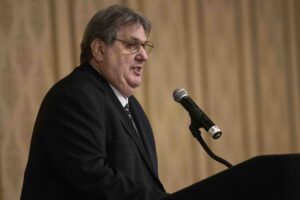
The 11 years at the Sun were tremendous. The 19 years that followed at the Las Vegas Review-Journal were equally rewarding as I got to cover so many big stories. But the 2 1/2 years I spent as senior editor at Gaming Today may have been my proudest accomplishment. I took over a struggling weekly, helped give it a fresh look, raised the level of the writing and turned it into a national publication. We even won a first place award from the Nevada Press Association, the first and only one in the paper’s 46-year history.
It took a pandemic to end Gaming Today. But the work we did and the accomplishments we achieved will never die.
There are so many people to thank. Too many, in fact. But I would like to acknowledge my brother Norm, who came down from Reno today to celebrate with me. I think he’s still mad at me for the time I criticized his play in a story I did in the Brooklyn Graphic on Midwood High’s baseball game with Lafayette High.
I did not know it at the time but he was playing with a broken foot. And I learned a valuable lesson — make sure you get your facts right before you criticize someone.
I’d also like to thank Herb Jaffe, a great journalist in his own right and a Hall of Famer himself, along with his wife Fran, for being here today. The Jaffes are like my surrogate parents and Herb also generously agreed to edit my Golden Knights book back in 2018. Thank you both for being here.
And I’m truly honored to have one of America’s greatest sportswriters, Jerry Izenberg, here along with his wife Eileen, here for me today. Jerry, who recently turned 92, has been inducted into 15 Halls of Fame. Thank you both for taking time out to be here.
My thanks to the Greenspun family for allowing me to come work for the Sun and to Sandy Thompson, Dean Juipe, Gov. Mike O’Callaghan and Ruthe Deskin, who were all so supportive of me.
I want to thank my R-J family — Sherm Frederick, Tom Mitchell, Charlie Zobell, Jim Fossum and Al Leiker, who brought me over from the Sun in October 1999. To Joe Hawk, who followed Jim as Sports Editor, to Mark Whittington, the best boss I ever worked for and someone who understood reporters, and Bill Bradley. Yeah, we knocked heads a few times but I’d like to think the good outweighed the bad.
And I want to also thank Bill Paulos, the former publisher of Gaming Today, and Howard Barish, the managing editor and general manager, for bringing me on board in September 2018, and to our staff of 32 writers and columnists who helped elevate GT’s quality.
Finally, I want to thank Ed Graney, who nominated me for this honor a couple of years ago. Honestly, I didn’t think I’d ever get in. But here we are and without Ed going to bat for me, this likely doesn’t happen.
To be one of a handful of sportswriters and join Royce Feour, Steve Sneddon, Tim Dahlberg, Ray Hagar, Bob Macy along with Ty Cobb, and John Cahlan makes this honor extra special. Thinking about it, that would be one hell of a sports department.
I have been blessed to have had this incredible life journey. I’ve been fortunate to meet so many amazing athletes, coaches and executives, see and visit so many places — from midcourt at the Final Four to Centre Court at Wimbledon, and to have written about so many sporting events, both big and small. It has been an honor and a privilege to serve the readers of Nevada and beyond.
I’ve always tried to follow one simple rule in journalism — “It’s important to get it first, but it’s more important to get it right.” I’d like to think this is why I stand before you today.
Imagine, me and Mark Twain in the same club. Mrs. Passantino would never have believed it.
Let me start this by thanking Natalie Burt and Carri Geer for nominating me for this honor.
Now I want to do a little show and tell.
Would everyone who has ever edited my copy please stand? You know who you are. These are the people who made my writing better and they deserve my thanks as well as the thanks of readers. And they deserve the applause they seldom get. A few editors have passed away. When Charlie Waters edited me at the Reno Gazette Journal, I won a Best of the West first place in feature writing, one of the big awards in journalism.
I learned so much when Charlie and I sat side by side editing line by line my massive story on an FBI agent’s years undercover with the mob. That style of editing and suggesting rewrites is a luxury today that editors seldom have, but I am so grateful to Waters and the others who improved my copy and taught me that I didn’t have to write everything I had learned.
Yes, I wrote long. My friend Laura Wingard taught me many lessons with her editing as city editor at the RJ. I would give her a paper copy of a big story and it would come back to me with her red pen edits. It looked like my copy was hemorrhaging, possibly on life support. But they became better news stories.
So while I thank the Nevada Press Association for this honor, I have to thank editors who helped me along the way, from my early days as a copy kid at the Christian Science Monitor, to my first efforts covering politics at the Southwest Times Record in Arkansas. There my stories about political rallies always included what kind of pie was served with the standard chicken dinner served.
Okay, the menu should have been edited out.
I was hired by the RJ in 1976 and the Reno Gazette Journal in 1986. A few years later I returned to the RJ. From federal court to politics to the mob to gaming, it was a joy to be a journalist, especially in Nevada. Those were the days when the governor returned your calls, not some spokesperson using email hoping you would cut and paste some drivel.
I am grateful for the variety of stories I covered and the time period when I covered them. A time when the town was smaller and you could see mobsters at bars and restaurants and say hello. A handful of reporters and I went to a bar one night, knowing it was a mob hangout. Anthony Spilotro sent over a round of drinks. At first we were thrilled. Then I was ashamed that we were treating him like a movie star.
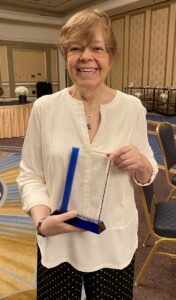
Then there was the time at lunch Spilotro sent wine over to me and an FBI agent. The agent considered pouring his on the floor. In stead he walked out, I eventually went over to talk to Spilotro in that squeaky little girl voice I sometimes use when I’m nervous.
Yes, I have a tell.
As a news reporter, I polished my craft and learned the game of hardball.
When Steve Wynn opened the Mirage in 1989, he refused to give local journalists interviews — including me.
But then he gave the New York Times and the Wall Street Journal interviews and it ticked me off.
I told Mirage spokesman Alan Feldman that Wynn was certainly entitled to permit the news coverage however he wished.
But … I added, “But when the first damn dolphin dies, the New York Times won’t be here. But I will.”
I got my interview and so did other local reporters.
My last reporting stint at the RJ was covering politics and it became my world. I kept my opinions to myself and did some of my best work, including teaming up with a colleague to uncover a land deal that would have benefited Congressman Jim Bilbray’s friend to the tune of millions of dollars. Bilbray didn’t get re-elected and the land deal didn’t go through.
Then when I became a columnist in 2003, I had the joy of writing about anything I pleased. When I said I wanted to write about the first time I colored my hair, fellow Hall of Famer Tom Mitchell rolled his eyes, but didn’t say no. When the Mandalay Bay opened its new topless pool. I put on my old lady one-piece swimsuit with a skirt and wrote about what I saw, primarily older men with hope in their eyes.
But most of my columns were serious. Ethical lapses by judges, lawyers, doctors, politicians, even charities.
I’m grateful for this honor and I’m grateful for my journalism career spanning 48-years, a career I loved and let’s face it, never really left.
Thank you to the Nevada Press Foundation and the board of directors.
I’d also like to thank my family for their understanding and support — wife Robin and children Courtney, Mathew and Kevin who are here today with their families.
Having a journalist in the family leads to skipped events and occasions and far too many missed family dinners.
I have to thank my parents. My dad was always a newspaper subscriber and encouraged me to read everything, starting with the comics. My mom supported me unconditionally, no matter how many times I screwed up.
I want to congratulate Jane Ann, Steve, Tom Mitchell, Mr. Brown and, of course Jeff Germain whose contributions and sacrifice rise above us all today.
I wasn’t expecting Richard Karpel’s phone call about my election to the hall of fame.
After all, I’m a guy who got lost on his first professional reporting assignment.
I’m a guy who when dictating the results of a boxing match once switched the IDs of the winning and losing fighters.
Nearly 50 years after starting my career as a copy boy on the graveyard shift at the old Los Angeles Herald-Examiner.
I still can’t type.
So I am honored and humbled to be here today.
While it is correct alphabetically, it just doesn’t seem right that Tait should be so near Twain.
I’m joining a hall with so many notable and respected journalists, writers, reporters, photographers, editors and publishers some of whom I have had the great opportunity work with, including some journalists from The Associated Press.
Sports columnist Tim Dahlberg who is one of the finest writers — not just sports writers — that I have had the pleasure of reading.
Brendan Riley covered the statehouse in Carson City for more than three decades, holding politicians and bureaucrats accountable.
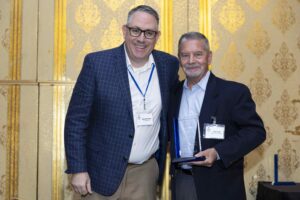
I was lucky to work with them and so many other talented journalists, including AP Las Vegas reporter Ken Ritter, who I worked side by side for more than 20 years — he of the sharp elbows, hard questions and unwavering devotion to facts. For Ken it’s not enough to generally get the story straight, he insists on being precise.
That’s a lesson for all of us in journalism. In this time of conspiracies and election deniers, at a time when social media relentlessly spreads misinformation if not outright lies, our most important tool is the truth.
We must get the facts, get the story, get it right and get it out.
I have been fortunate over the years in newspapers and at the AP to have worked with so many skillful and dedicated people who have done just that and done it well — many of them right here in Las Vegas.
You know some of them personally and some by their work here at the AP and later with other media outlets like the New York Times.
Oskar Garcia. Adam Goldman. Hannah Dreier. Kathleen Hennessey. Jae Hong, John Locher, Michelle Price and Michelle Rindels to name a few.
I learned from all of them and countless other reporters and editors.
In newspapers and at The Associated Press I had the remarkable opportunity to help cover history on a daily basis to have a hand in big stories and small.
Floods and fires. Mergers and murders. Campaigns and caucuses. Executions and elections.
I’ll miss the energy of Election Night, though the day after not so much — especially if we return to our caves and count ballots by hand.
I was able to help direct coverage of John Ensign’s fall and the curious tenure of Jim Gibbons.
The always interesting his honor Mayor Goodman. The accomplishments of Gov. Kenny Guinn and Harry Reid.
And the exploits of Steve Wynn and OJ Simpson.
We are approaching the anniversary of the most difficult story of my career. 1 October.
For me it began with a phone call.
I was lying in bed reading after returning from that year’s Press Association convention.
My cell phone rang at the bedside.
“Dad they are shooting at us.” It was my youngest son Kevin, there attending the concert with my daughter and their spouses.
That began countless hours of directing coverage of a tragedy of immense proportions, a story of evil, heroes and heartbreak _ all the while knowing my kids were in the middle of it.
I alerted the overnight desk and a News Alert moved shortly.
Sitting at the kitchen table with my laptop I scrambled reporters and photographers and kept various editors and desks around the AP informed while Robin sat nearby and passed along what we knew as fact to my kids through a long and hectic night.
Only later did we learn from the FBI that my kids were in the so-called killing zone, right to the side of the stage.
Through courage, quick thinking and a fair amount of luck they survived.
The story would continue for months as we pored through countless hours of video and pages of transcripts trying to explain the worst mass murder in modern U.S. history.
There are many lessons to come from the 1 October story but today I’ll focus on courage and smarts.
Those are traits of so many people in this room.
Reporters, photographers, video journalists, editors and publishers.
Each day you put your many skills to the test facing endless deadlines, staffing challenges and growing hostility. Journalists always have been criticized. It’s the nature of the business. But healthy criticism has turned to outright antagonism.
Journalists are harassed, cursed, threatened, assaulted — and shockingly killed. And yet you continue each day to serve the vital role — to seek the truth, expose injustice, hold the powerful accountable.
To get the story, get it right and get it out — with courage and intelligence. I am honored and humbled to have been included in your ranks. Good luck and thank you.
MARK BROWN ON BEHALF OF BOB BROWN
I want to take you back to a different time and era.
The year was 1955, and a young Bob Brown, who studied journalism at the University of Michigan, had been discharged from the Army, where he wrote for the Stars and Stripes and earned a silver star as a military policeman. Dad was hired as a chief foreign correspondent for United Press covering Asia based out of Taipei.
My mother, Audrey, who is in the audience with us today, can remember those days sitting in the back of taxi cabs rushing through the city as Bob, on a tight deadline, hammered out breaking stories on his laptop — an Olivetti Lettera 22 portable typewriter.
Indeed another time and era.
In 1959, Bob knew it was time to return stateside and needed a job. Through various connections, he met a newspaper owned by Donald Reynolds and was offered a job as editor of one of his newspapers, The Morning News in Roger’s, Arkansas.
After a short stint in Roger’s and as a rising star in the Reynolds organization, dad was dispatched to another Reynolds paper in Juneau, Alaska as editor of the Juneau Empire.
From there, Mr. Reynolds asked dad in 1961 to move to Las Vegas to become editor of the Review-Journal. The RJ was losing circulation to the Las Vegas Sun, and Reynolds wanted to infuse new energy into the paper.
We came across some of the original letters offering him the job, and his starting salary was $565 a week. This position lasted until late 1964, when dad resigned his position because Reynolds was dictating coverage in the US Senate race between Paul Laxalt and Howard Cannon (Cannon won by 16 votes).
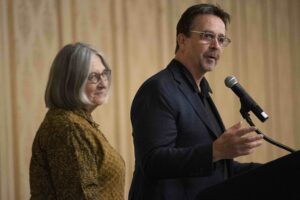
Reynolds directed dad to write an editorial supporting Cannon and told him that as editor of the paper, he would determine who the paper endorses. In late October, weeks before the election, he penned an editorial supporting Laxalt in the Senate race, and dad resigned the next day.
Interestingly, we have hundreds of Western Union telegrams from journalists (including Walter Cronkite) and political leaders worldwide supporting his decision to stand up for what he believed.
Another time and another Era.
From there, we moved to Tucson, AZ, where he became publisher and editor of the Tucson Daily American, a newspaper Wayne Newton funded because he was upset about coverage he was getting from the other Tucson daily newspaper.
That ill-fated newspaper didn’t last long, and our family returned to Las Vegas in 1968.
During this time, he consulted with the publisher of the Connecticut-Winsted Daily Times and started an advertising agency and PR firm.
But he was a newspaperman at heart, and in 1973, he sold his advertising agency to one of his employees, Sig Rogich (who would rename the agency RR Partners). He purchased the North Las Vegas Valley Times, a three-times-a-week tabloid newspaper.
Soon, he turned it into a daily paper and hired such outstanding journalists as A.D. Hopkins, Bruce Hasley, and Ned Day. At the time, it made Las Vegas the only city besides New York with three daily newspapers.
It was hard-hitting, bare-knuckle journalism and became a must-read for the movers and shakers around the state.
It was also during this time that he purchased the Lacy Leader in Lacy, Washington.
He also started a Football Publication that was ahead of its time called Tom Harmon’s Football Today, printed every Sunday afternoon on the Valley Times presses during the NFL season.
While the Valley Times was a must-read for the who’s who, it was undercapitalized and struggled financially.
The RJ had a circulation of about 70,000, the Sun 40,000, and the Valley Times about 15,000.
At some point, to keep the paper alive and his passion alive, he made some poor decisions in how he funded the newspaper.
He admitted his mistakes, and the community looked passed those indiscretions by holding a Save the Valley Times party. The party drew hundreds of people and raised thousands of dollars, putting the paper back on track financially.
Unfortunately, soon after this period, in 1984, my father died quietly in his sleep of a heart attack at age 54.
Bringing to end a partially written story of an old-school journalist. In recognition of his service to the state, Brown was posthumously honored as a Distinguished Nevadan by the Nevada System of Higher Education.
Yes, it was undoubtedly another time and another era.
STEVE SEBELIUS ON BEHALF OF JEFF GERMAN
With all due respect to the foundation, I really don’t want to be here this afternoon.
I really don’t want to be standing here to accept on behalf of Jeff German his induction into the Hall of Fame.
By all rights, Jeff should be standing here himself to receive this recognition. And we all know why he isn’t: earlier this month, Jeff was murdered outside his home, allegedly by someone who disliked his reporting and wanted it to stop.
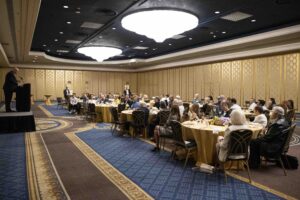
That’s why Jeff is being inducted this year, just weeks after his death, a death that has left the Review-Journal newsroom reeling and still coming to grips with the grief that attends the loss of a valuable colleague and friend.
But while Jeff’s death has hastened his entry into this hall of fame, we shouldn’t forget his life and the work that preceded it.
In fact, as far as I’m concerned, Jeff earned his entry into the hall of fame a long time ago.
I first met Jeff at the Las Vegas Sun, where he’d already earned a reputation as a dogged investigative reporter. He covered the influence of the mob at the tail end of its influence in Las Vegas, and the city’s transition to a new era of corporate ownership.
He came in every day chasing the story. His mantra — “it’s big!” — to describe his latest story, nearly every story, became a catchphrase in our little group. “Jeff, is it big?” we’d jokingly ask. He’d always confirm: “It’s big.”
Jeff covered some of the most high-profile issues affecting this community, including the unforgettable Jerry Tarkanian scandal and his hugely controversial exit from UNLV.
The thing about Jeff was that he was entirely dedicated to his craft, and committed to every story that he did. He never gave up on a story, no matter how much time had passed. More than once, I told colleagues who fretted that somebody was going to get away with something, “Don’t worry; Jeff German is on that case, and he never, ever gives up. He’s like a dog with a bone.”
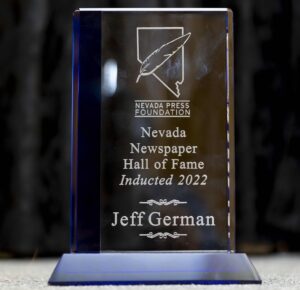
Jeff wasn’t perfect; none of us are. But he tried hard to get the story right. He and I worked together on a recent piece he wrote, and he must have called me five or six times during the editing process, asking about a particular word or phrase. He cared deeply about his work. And I realized during that process how he got all those sources to talk over all those years: total relentlessness. Like the Terminator.
Jeff was 69 years old when he was killed, but that old dog learned new tricks up until the very end: He was the host of a popular podcast called “Mobbed Up,” learning an entirely new medium that didn’t even exist when most of us in this room entered on our journalism careers. And he got very good at it.
He took on some of the most powerful and popular people in town, including investigating the lavish spending at the Las Vegas Convention and Visitors Authority. His stories led to the retirement of the authority’s president, Rossi Ralenkotter, when Jeff revealed spending abuses in that organization.
He exposed the high-flying antics of Las Vegas Councilwoman Michele Fiore, who took an unusually large number of trips on the LVCVA’s dime. He also told readers about the FBI investigation into her campaign finances, including a raid on her home, and a fight at City Hall in which she allegedly attacked a fellow councilwoman. We may never know what really happened; the video of that incident mysteriously disappeared, after Jeff had asked for it under public records laws.
But Jeff wasn’t partisan: He also broke the story about up-and-coming Democratic Assemblyman Alexander Assefa, who did not live in his district and who made personal use of his campaign funds. The revelations forced Assefa to resign.
And Jeff took on obscure subjects, too, but always with an eye toward helping people who were powerless, who were being abused or whom no one else cared to defend. That’s how Jeff came to write about problems in a tiny little county office known as the public administrator.
We hear a lot these days about people being canceled, when they lose their jobs or get kicked off social media platforms for things that they say. But Jeff was literally canceled, allegedly by a person who resented what Jeff had already reported, and wanted to keep from the public the things Jeff was planning to report in the future. In the ultimate act of censorship, Jeff was murdered, murdered for the work that he spent his entire life pursuing, up until the very day he died.
Former Metropolitan Police Department Lt. Randy Sutton was on Fox News the other day, and he called Jeff’s killing a “line of duty death.” And I agree that it was. On our job, we don’t have 21-gun salutes, or bagpipers, or funeral processions down the Strip or buglers playing “Taps.”
But we do have this: A hall of fame to recall those people who devoted their lives to journalism in this state. And as I stand here today, I cannot think of any person who deserves to be in this hall more than Jeff. Not only for the way he died, but also for the way he lived, and the work he did in this town over four decades.
So on behalf of Jeff’s family, on behalf of his many friends and colleagues, on behalf of the Las Vegas Review-Journal and its newsroom, I am honored to accept this hall of fame induction for Jeff German. Thank you to the foundation and its board for this honor, and thank you to this audience for your kind attention.
 Nevada Press Association The best in Nevada journalism since 1924
Nevada Press Association The best in Nevada journalism since 1924
